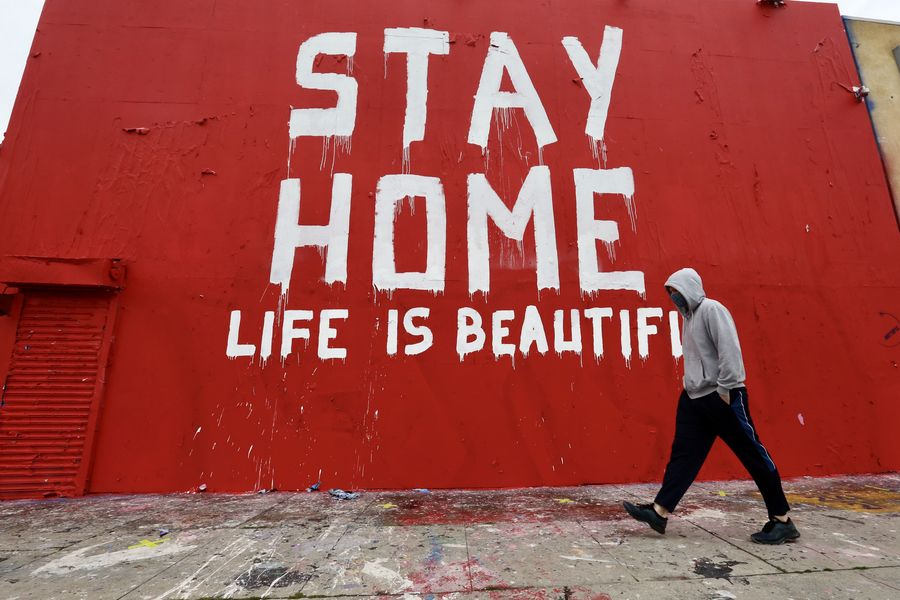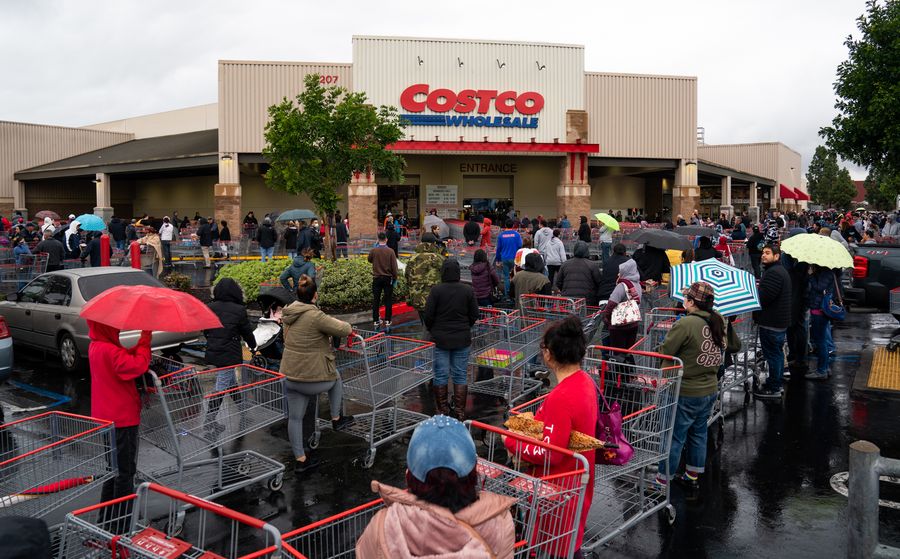
A man walks past an epidemic themed mural in downtown Los Angeles, the United States, April 10, 2020. (Xinhua)
"There's been a joke travelling around the WeChat netizen community: 'China played the first half of the game, the rest of the world played the second half, and overseas Chinese played the full game.' This is exactly how we feel." Wei Xiong, a freelance writer better known by his social media handle, 'Wei Way,' told Xinhua from his home in Altadena, a community 23 km north of Los Angeles downtown.
"I can't claim to speak for others' experience. I can only recount how my family is playing this cruel game," he said. "But we are thriving. Not in the traditional sense of winners and losers but in hopes of continuing in this game."
Like Chinese living all around the world, Xiong and his family's fight against the novel coronavirus kicked off in January, when much of the world was still grieving Kobe Bryant, Los Angels Laker's retired superstar who passed away in an accident on Jan. 26. At that time China's Wuhan has been locked down.
"Our first reaction was concern for our families back in the motherland. We saw the fear in our family's eyes through the phone. We mostly just checked in on them through video chat as they went through this extraordinary period," Xiong said, recalling that his family members managed to bring his grandpa, who happened to be in the hospital before the outbreak for an unrelated condition, back home.
He said it was both heartbreaking and heartwarming to see pictures and videos through the family chat group of his aunts and uncles in full protective gear rushing his grandpa in a wheelchair through the hospital and into the safety of home.
After the initial terror, Xiong's family adapted to a new lifestyle in China, where 1.4 billion people suddenly disappeared from the streets to shelter in their high-rise apartments in order to cut off all infection routes of the virus.
Self-quarantine was not comfortable for the Chinese since most of them did not have much room for activities, Xiong said. "You may have seen the video of my grandma walking back and forth on her tiny third-floor balcony with her mask. She did that every day, for two months."
But very soon, Xiong had to take his similar time in the United States. In early March, the infection rate started dropping in China but it was just getting started in California. On March 19, the mayor of Los Angeles and the governor of California issued the "safer at home" order, which blew whisper for Xiong's "second half game."
Prior to COVID-19, Xiong's life was one big party literally.
The freelance writer worked as an event planner in charge of sourcing hundreds of foreign singers and performers for the Qingdao Beer Festival -- China's version of Octoberfest, host to more than 5 million visitors each August who come to chug-a-lug to their heart's content on beer and ale from around the world.
Xiong knew there could be no bottoms-up this year after protocol against the fatal disease shuttered venues in Los angeles and almost cut off air transportation across the Pacific, but he never imaged to fight the virus with his parents by their immune system.
Xiong had moved back in with his parents prior to the COVID-19 outbreak after being sidelined by a nasty car accident, so he was already sharing a tough time with them when the lockdown came into effect.
"My parents and I all came down with flu-like symptoms, coughing and congestion. We tried getting tested but were turned away because we didn't develop fevers. This was in the beginning when tests were scarce. We had to get better on our own regardless what the virus was." he recalled.
"The first couple of weeks were difficult. My dad carried us through. We were all feeling fatigue, but he knew we had to rely on our immune system to get through this first battle. On top of eating, drinking, and sleeping right, my dad dragged our tired bodies out of bed and we took nightly walks up the quiet hills," he said.
"Being outdoors and exercising guaranteed that we had clear air in our lungs and energizing our immune systems to battle the virus. We fought for approximately two weeks, the symptoms were relentless but we fought through them." Xiong said. "We are lucky to be living in Altadena where the population is significantly less dense than the inner city. Los Angeles is relatively sparse compared to San Francisco."
"I was lucky that my parents were there for me," he said.
A prolonged time in self-quarantine with his family has given Xiong time to reflect on the nature of a good society and the shape of the world he wants to live in.
As the supervisor of the City of Hope Comprehensive Cancer Center's Pathology Core Laboratory, his mother, Aimin Lee, used to spend her days overseeing 5-micron slices of patient blood samples embedded in paraffin blocks so they can be viewed under a microscope.
Now, working in the lab only one day a week and from home for the other four days, she spends more time slicing homegrown onions and green beans into savory dishes of dumplings or whipping up batches of plump steam buns and traditional Chinese noodles.
Xiong's father, Shigang Xiong, formerly an oncologist in China, is now an assistant professor at the Department of Medical Oncology, Norris Health Sciences, University of Southern California (USC).
He, however, still does not cook much, but he does his part in the garden, planting, weeding and harvesting, and the whole family all work together to design and landscape their yard, as part of their daily exercise regimen.
They have all learned the power of a close-knit community. The family is philanthropic by nature and share their food with the neighbors and vice versa, swapping dishes, fruits and vegetables over the fence, at a safe social distance, of course.

Local residents wait in lines outside a Costco supermarket in Los Angeles, the United States, March 14, 2020. U.S. (Photo by Qian Weizhong/Xinhua)
They also share masks and sanitizer and other health supplies, dispense tons of free health care advice, and take time to look after local elders in need.
"Once a new package of medical supplies arrive, we split and deliver them to those who need. Mostly among friends and neighbors; some to medical facilities. I dropped some off to Huntington Hospital. Thanks again for taking care of me." Xiong said.
"Neighbors are helping neighbors get through this," Xiong told Xinhua. "And for the bigger picture, that's the way it should be. There is enough food for everyone on the planet. There is enough money for everything we need to do. So why are some people still starving? Why are so many still living in poverty?"
He hoped that others use this time to seek their own inner wisdom, that people -- especially the younger generation -- will take this opportunity to become more environmentally conscious and more concerned with the welfare of their fellow man, not just with consuming.
"We need to learn to consume less and live simpler lifestyles, with sustainable home or community gardens and farming coops so we can produce more food locally so that people with land or skills can all contribute, then pick their share of the harvest," he said.
In turn, he believed local farming could create jobs for some of the out-of-work service workers who risked their lives for minimum wages during the lockdown only to find themselves replaced by delivery drones and automated kiosks.
A USC graduate raised primarily in the United States, Xiong is intrigued by the differences between how the United States and China were coping with the crisis. "China's model of governing is very effective. They are out of it already and that's an impressive turnaround," he said.
"The United States.. gets much of its greatness from being a traditionally immigrant country where people come from all over the world to contribute their ideas and efforts," he said.

